ORGANIC Pumpkin seed oil
roasted


Austrian agriculture
- 100 % organic quality
- made from roasted organic pumpkin seeds from Styria
- Rich in valuable vitamin E
- dark green oil with an intense flavor
- the classic for pumpkin soup
- for salads, soups, sauces and desserts
from 2016 ratings


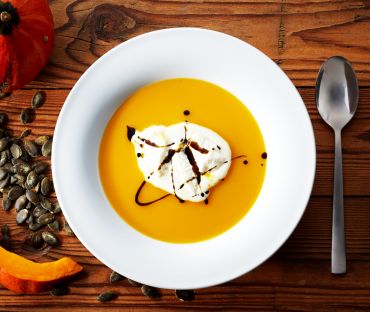 Styrian specialty: Cream of pumpkin soup with pumpkin seed oil
Styrian specialty: Cream of pumpkin soup with pumpkin seed oilOur roasted pumpkin seed oil made from Styrian organic pumpkin seeds is a popular edible oil with a dark green color and aromatic taste. Compared to our virgin pumpkin seed oil made from unroasted seeds, this oil is significantly nuttier and more intense. To produce roasted pumpkin seed oil, around 30 percent of the pumpkin seeds are roasted before cold pressing. After the roasting process, they are mixed with unroasted, untreated pumpkin seeds and processed into oil in spindle presses.
Pressing at temperatures of no more than 40 degrees preserves the valuable ingredients and the unique taste of the pumpkin seed oil. In Styria and in this country, pumpkin seed oil, roasted and unroasted, is considered a true delicacy in gourmet cuisine and is not only used to prepare savory dishes such as salad dressings and soups, but also to refine desserts such as ice cream and crêpes. Similar to balsamic cream, pumpkin seed oil is suitable for decorating dishes. With its dark green, almost brown color, it accentuates mozzarella and soups. Pumpkin seed oil is not suitable for heating or frying due to its high content of polyunsaturated fatty acids.
Organic pumpkin seeds from Styria
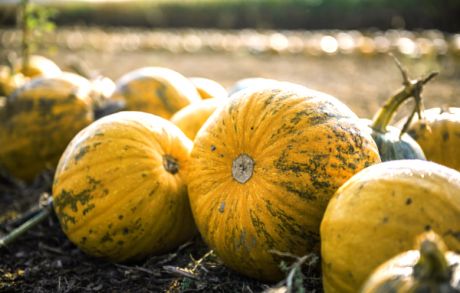 Yellow with green veins: the Styrian oil pumpkin.
Yellow with green veins: the Styrian oil pumpkin.Cold-pressed pumpkin seed oil is extremely popular with connoisseurs due to its intensely nutty, mildly spicy flavor. A particular specialty is pumpkin seed oil made from the seeds of the Styrian oil pumpkin (Cucurbita pepo var. styriaca), a variety of pumpkin that was cultivated in Styria at the end of the 19th century and was only known there until the 1970s. We source the pumpkin seeds for our pumpkin seed oil from Austrian organic farmers.
Pumpkin seed oil contains vitamin E
The oil, which is made from gently roasted pumpkin seeds, not only tastes delicious, but also scores with nutritional values: it contains 46 g per 100 g of polyunsaturated fatty acids. In addition to essential fatty acids, it also contains vitamin E (100 g of pumpkin seed oil corresponds to 240% of the recommended daily intake). Vitamin E helps to protect cells from oxidative stress. Make sure you eat a varied and balanced diet and lead a healthy lifestyle.
Pesto, spread and flour made from pumpkin seeds
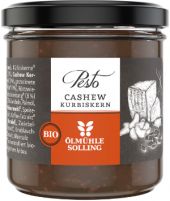
Our pumpkin seed oil is an ingredient in our cashew pumpkin seed pesto. This is carefully made by hand from cashew and pumpkin seeds, parmesan, roasted onions and a fruity hint of apple as well as our roasted pumpkin seed oil. The pesto with 100% certified organic ingredients not only tastes great with pasta or as a spread. It also scores highly in combination with warm potato dishes and classic potato salad. It is also delicious as an ingredient in dressings for leaf salads.
Our pumpkin seed coconut spread is a purely plant-based spread made from cold-pressed pumpkin seed oil, roasted pumpkin seeds and virgin organic coconut oil. The polyunsaturated fatty acids in the cold-pressed pumpkin seed oil complement the spectrum of saturated fatty acids in the virgin coconut oil. Although coconut oil contains saturated fatty acids, it is a special type of fatty acid. The white edible oil consists largely of medium-chain fatty acids, the so-called MCTs (medium chain triglycerides), such as the valuable lauric acid.
We also produce a fine pumpkin seed flour in our oil mill. This is made from virgin, unroasted organic pumpkin seeds, which are gently de-oiled and finely ground. The pumpkin seed flour contains around 8 g of pumpkin seed oil as well as around 62 g of vegetable protein and around 13 g of fiber per 100 g. Just like pumpkin seed oil, pumpkin seed flour is naturally green and a culinary rarity. It is perfect as an ingredient for bread and rolls or as breadcrumbs. As it is gluten-free, it can also be used for baking and preparing dishes if you have a gluten intolerance.
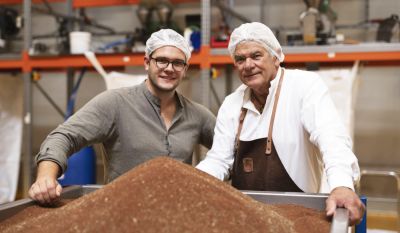 Sebastian and Werner Baensch during quality control.
Sebastian and Werner Baensch during quality control.Made in the family manufactory
The quality of our culinary delicacies is very important to us and our motto has always been quality over quantity. This means that much of the production of pumpkin seed oil is still done by hand. Starting with the selection of organic raw materials, the careful production of the oil, which is always produced in small batches, and the filling into UV-protected glass bottles. In this way, the valuable ingredients such as polyunsaturated fatty acids, vitamins and secondary plant substances are preserved in the best possible way and our oils make an important contribution to a wholesome diet. More and more health-conscious people are recognizing the value of natural organic products for a healthy and balanced diet. In order to guarantee the quality of our products at all times, we carry out extensive internal and external quality testing and assurance by state-approved specialist laboratories. In September 2020, an NDR film crew visited us and also reported on pumpkin seed oil production at our oil mill in the report Kürbisbauern im Erntefieber (Pumpkin farmers in harvest fever ).
Usage
Our Styrian pumpkin seed oil is ideal for use in hot and cold dishes - for example in salads, soups, sauces, cheese, meat and vegetable dishes and with vanilla ice cream. Pumpkin seed oil is not suitable for frying due to its high content of polyunsaturated fatty acids.
Recipe
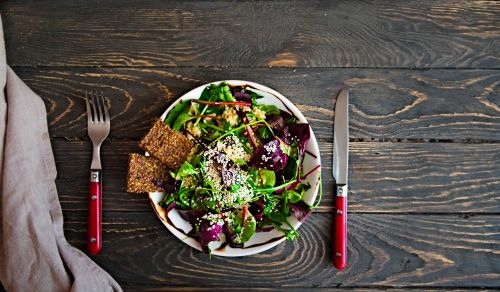
Original Styrian salad dressing
Original Styrian salad dressing is a culinary highlight for many salads as well as vegetable or meat dishes. Perfect with pumpkin seed soup or mashed potatoes. zum Rezept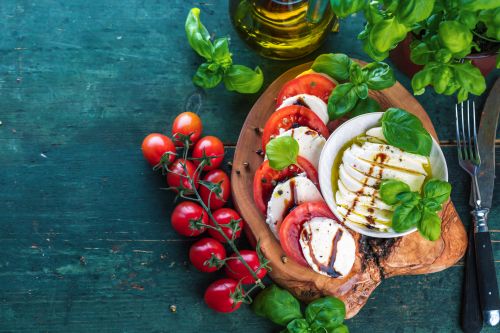
Tomato mozzarella salad
Dressing tomato mozzarella salad with pumpkin seed oil instead of olive oil creates a special taste. Garnish with basil and season with a pinch of salt and pepper. zum Rezept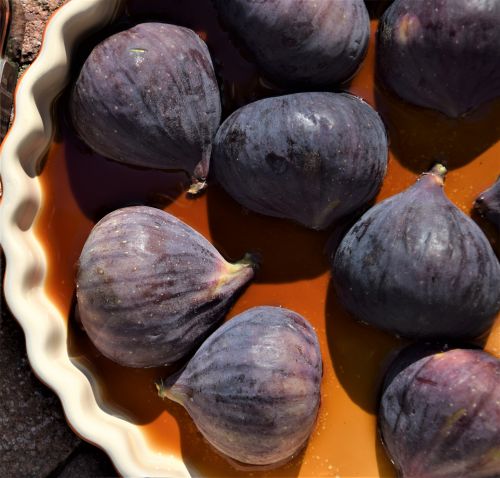
Marinated figs
Fresh figs marinated in our mild apple orange balsamic vinegar. Caramelised with cane sugar and served with Parma ham, parmesan and roasted pumpkin seed oil. zum RezeptRatings
Specification and ingredients
Pumpkin seed oil
Average energy and nutrient content for 100 g
**Percent of the reference quantity for the daily intake
Please enjoy our products as part of a diverse and balanced nutrition.
As a product of nature the composition of the oil can vary, the given specifications are therefore average values.
Ingredients
Pumpkin seed oil, certified organicDurability
9 - 12 monthsLagerung
Store in a cool and dark place.Fatty acids diagram
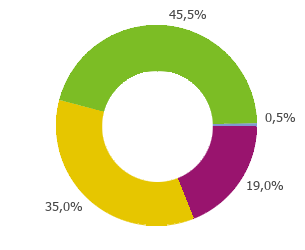
Botanical name: Species such as Cucurbita maxima or stilbo of the genus Cucurbita
Origin:
The oil pumpkin is traditionally cultivated in southern Styria, southern Burgenland and the neighboring areas of Hungary and Slovenia as well as in China and imported from these countries. The crop has only been cultivated on a larger scale since the beginning of the 20th century. The fruits, which weigh around 8 to 10 kg, ripen on the sandy-loamy soil in a special climate of warmth and humidity. When the pumpkin fruits have changed color from green to yellow-orange in autumn, the up to 1000 seeds are extracted from the flesh by machine or, in small farms, by hand. The seeds are washed and dried at 50 °C to make them storable. They can then be ground. The advantage over olive oil production is that pumpkin seed oil can be pressed from the storable seeds all year round, depending on requirements. To extract the pumpkin seed oil from the dry flour, the ground seeds are mixed with water and salt and roasted until the water has evaporated, stirring the mixture constantly. Roasting is necessary to separate the protein contained in the seeds from the oil. The finished porridge - also known as oil cake - is now pressed. In the past, the pulp was pressed out in a massive wooden device ('Styrian oil cow') by pressing two special wooden inserts on top of each other. The pressing was done by beating on a wooden wedge (oil beating), which gave rise to the job title of oil beater. The freshly pressed pumpkin seed oil is left to stand for a few days to allow the suspended matter to settle. To obtain one liter of pumpkin seed oil, you need approx. 3 kg of seeds or approx. 35 pumpkins. The pressed residue (also known as oil cas') used to be used as feed in pig farming.
Certification
The pumpkin seeds used for our roasted pumpkin seed oil are certified according to BIO VO 834/2007 and VO 889/2008 or 1235/2008.
Regulation (EC) No. 1924/2006 of the European Parliament restricts nutrition and health claims made on foods. This means that from December 12, 2012, it will no longer be possible to refer to the nutritional and physiological effects of foods and food supplements. (Only the pharmaceutical industry is now allowed to do this. )
READING TIP: If you would like to find out more about vegetable oils, please refer to the following publications and websites:
- www.systemed.de
o Positive things about fats and oils ISBN 978-3-942772-57-0
- www.olionatura.de
Krist, Sabine, Buchbauer, Gerhard, Klausberger, Carina: Lexikon der pflanzlichen Fette und Öle. 1st edition. Vienna: Springer-Verlag: 2008.
Note:
The (press) legal responsibility for all of the content lies exclusively with the respective authors or authors/webmasters. We assume no liability for their correctness or their compliance with all relevant legal regulations.




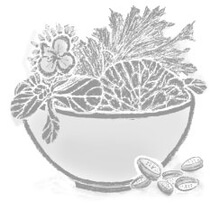
 Pumpkin seed coconut spread
Pumpkin seed coconut spread Pumpkin seed flour
Pumpkin seed flour Pumpkin seed oil
Pumpkin seed oil